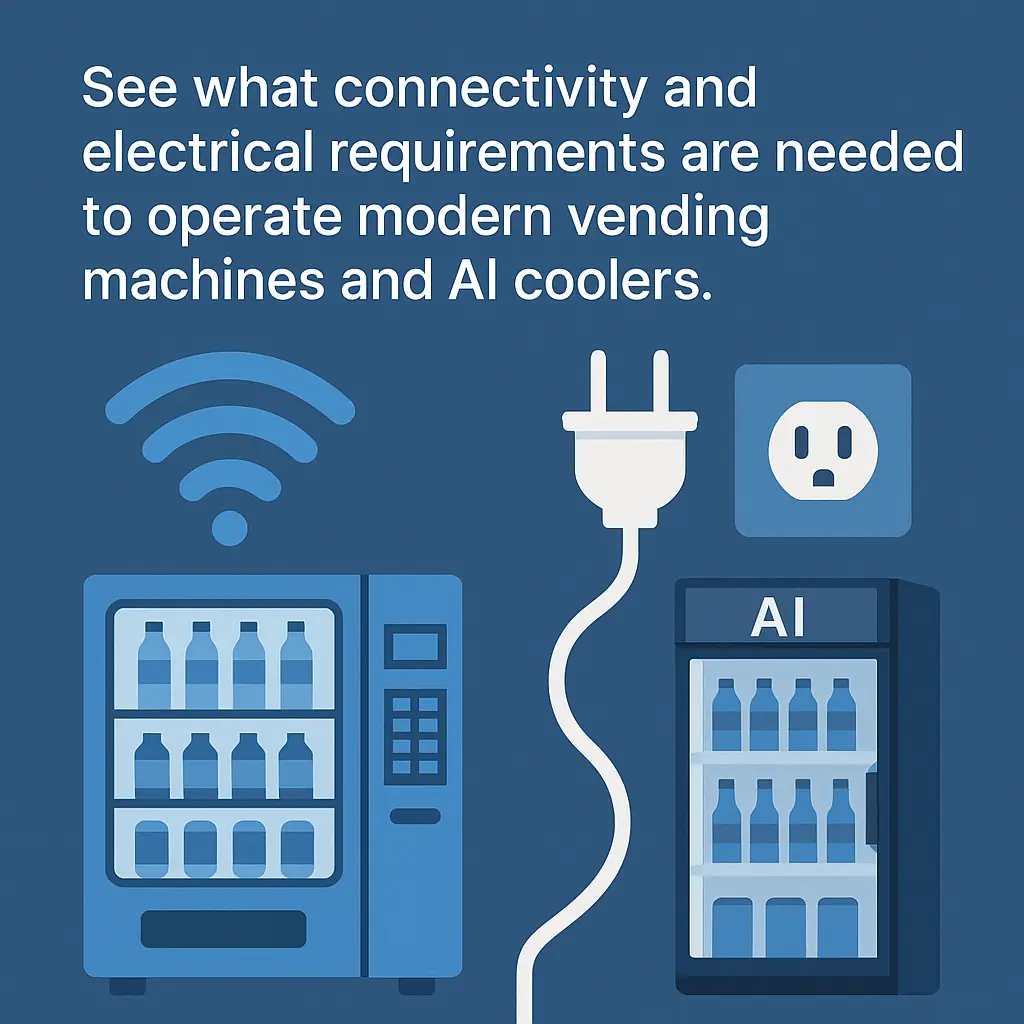Do Vending Machines Need WiFi or Power?
See what connectivity and electrical requirements are needed to operate modern vending machines and AI coolers.
Back to Vending Info for Businesses ResourcesSee what connectivity and electrical requirements are needed to operate modern vending machines and AI coolers.
Back to Vending Info for Businesses ResourcesMost vending machines require electricity to function, but not all need WiFi. Traditional snack and drink machines often run offline, while modern smart machines, AI coolers, and micro markets typically need both steady power and internet access for features like touchless payment and live inventory monitoring.
![]() Smart vending features require consistent power and internet access
Smart vending features require consistent power and internet access
![]() AI-enabled coolers need WiFi for user tracking and inventory
AI-enabled coolers need WiFi for user tracking and inventory
![]() Standard combo machines usually work without internet access
Standard combo machines usually work without internet access

Modern vending machines vary in their technical requirements, but most do need a reliable power source. Standard vending units, like snack and drink combo machines, typically require a 120V power outlet, which is the same as most household appliances. These units can function entirely offline, using onboard systems to manage purchases and inventory updates manually.
However, more advanced vending equipment such as smart vending machines, AI coolers, and micro markets often rely on both power and WiFi. These internet-connected devices use live data to monitor stock levels, enable remotely managed pricing, and allow contactless payment systems such as Apple Pay or credit card readers to function smoothly. An internet connection improves customer experience and helps operators reduce machine downtime by identifying service needs before users even report them.
AI-powered machines in particular often include automated user authentication, digital screens, and real-time tracking features—all of which require an active WiFi connection. Without internet, these intelligent devices may lose access to key functionality or be unable to process transactions at all.
It’s important to assess your facility’s connectivity and outlets before installing a modern vending solution. Some vendors offer cellular-connected machines for areas where traditional internet is not available, but these may come with data usage limitations or added cost. If you're unsure what type of infrastructure your location supports, vendors can usually recommend a suitable solution after conducting a quick site assessment.
For business managers planning a new setup or replacing outdated machines, knowing these requirements helps avoid long setup times and compatibility issues. Clear access to power outlets and stable WiFi ensures today’s machines operate reliably and offer the tech-savvy amenities customers expect.
To further explore what items to include once your machine is operational, check out ideas for low-sugar snack options or see tips on restocking your breakroom effectively.
If you're exploring vending options for your business, Vending Exchange can help simplify the process. Delivery, Installation and Equipment is provided at no cost to you - vendors provide the machines, keep them stocked, and handle all servicing. Whether you need a provider or full-service management, just fill out the form on this page to get started.
No, only smart vending machines, AI coolers, and micro markets require WiFi. Traditional machines usually work offline.
Most vending machines require a standard 120-volt outlet, similar to household appliances.
No, all vending machines require electricity to power cooling systems, lighting, and payment components.
Some may continue limited functionality using internal memory, but payments and sync features may stop working.
Yes, some machines can use cellular connections as an alternative to WiFi, but may incur extra fees.
In most cases, yes—machines plug into standard outlets as long as one is nearby.
Not always. Basic combo machines offering snacks and drinks often operate fully without internet.
Yes. Internet enables contactless payments, real-time monitoring, and more efficient service responses.
Internet downtime or poor signals can interrupt service, but vendors often configure reliable backup options.
Check for standard outlets and available WiFi access—or consult a vending provider for a site readiness check.